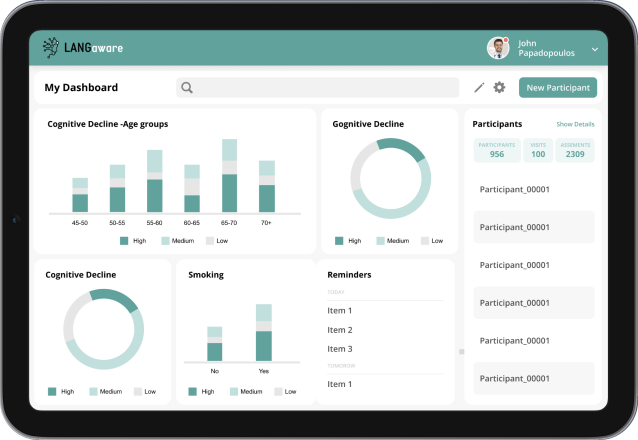7 Top Takeaways and Trend Predictions from the 2023 Behavioral Health Tech Conference (BHT2023)

Reality: Number of *Qualified* Psychiatrists ≠ Number of Patients.
The number of patients who seek mental health support has increased due to higher awareness of mental health issues and the lasting impacts of global events.
As the number of people seeking support rises, the burden on mental health professionals intensifies. Unfortunately, the workforce hasn’t expanded at the same rate to meet this soaring demand.
However, technology is democratizing this sudden jump in mental health support needs.
With various technological advances like Telepsychiatry and Teletherapy, providers can streamline routine tasks, such as appointment scheduling and administrative work—providing around-the-clock support for the comfort of patients seeking mental health support.
The integration of tech into mental health not only addresses the immediate demand but also improves the overall quality, accessibility, and efficiency of services—empowering both professionals and patients, offering a care continuum that is personalized, affordable, and more responsive to individual needs.
Collaboration can be a solution to most mental health tech problems.
With barriers in mental health, everyone needs to visit a multitude of solutions—so we can choose the best of the best for those seeking support.
Thought leaders like Megan Jones Bell PsyD and Anthony Sossong, MD, MS, brought insights into the digital tech space, shedding light on innovations breaking down access barriers and delivering data-driven outcomes.
BHT2023 showcased notable technological advances in mental health care.
Let’s take a look:
It’s incredible how the focus on health equity has evolved and gained momentum over the years. Take, for instance, the strides made by organizations like the Pat Tillman Foundation.
Their commitment to supporting military service members, veterans, and spouses highlights the importance of this issue and demonstrates the tangible impact that collaboration and innovation can create.
Health equity wasn’t a prominent topic at conferences a few years back. Now, not only is it being discussed widely, but significant actions are being taken to address it.
Technology has played a pivotal role in this transformation. Technology has become a cornerstone in promoting health equity by tackling diverse challenges and enhancing access to healthcare services.
Telemedicine, for instance, has broken down geographical barriers, allowing individuals, irrespective of their location, to access quality healthcare services. Similarly, wearable devices and health apps empower individuals to actively monitor their health, promote preventive care, and ultimately reduce disparities in healthcare access.
Data-driven approaches supported by machine learning and AI enhance diagnostic accuracy and treatment personalization, ensuring that healthcare interventions effectively cater to diverse populations. These advancements improve healthcare outcomes and contribute significantly to leveling the playing field for marginalized communities.
Zoom conferences have many benefits, but this in-person event allowed mental healthtech providers to connect in a true sense.
So many attendees highlighted how meeting Zoom colleagues in person was wonderful, connecting with friends, making new connections, and learning from the outstanding panelists.
With these types of events, highlighting informality is essential, as personal connections are crucial, and face-to-face connections still matter a lot.
For mental health tech providers, this means the opportunity to brainstorm, share ideas, and form partnerships that could lead to innovative solutions for mental health challenges.
At BHT2023, everyone engaged in real, unfiltered conversations, providing invaluable insights into diverse perspectives and challenges and aiding the development of more effective tech solutions.
We worked to ensure our founder event was fun and insightful for those in attendance—allowing them to exchange glasses of wine comfortably, meet investors, and chat with like-minded mental health tech founders.

Every generation shares its share of anxieties, fears, and traumas, and the technology umbrella must cover everyone. Here are some takeaways from the event on how to achieve this for adults and children.
Our team enjoyed these discussions; each touched on a human level, how people, employees, and colleagues feel, and how we can help provide better, genuine mental healthtech innovations.
Value-based contracts are the way to sustain integrated behavioral health. They jive with the model’s core ideas, especially when spotting mental health concerns early.
It’s about jumping in early, teaching providers and patients skills to manage their symptoms, offering medication when needed, and ensuring everyone’s on the same page for whole-body care.
The fascinating thing about this approach is how it’s about measuring progress and not just throwing stuff at the wall and hoping it sticks.
It’s about tracking results and ensuring what we’re doing works. And that’s huge because it means we’re not just delivering care; we’re delivering care that counts, care that makes a real difference in people’s lives.
BHT2023 gave us a robust exploration of how AI and machine learning are revolutionizing mental health care. One of the highlights was the emphasis on tech-forward solutions, putting AI at the forefront.
For instance, LANGaware’s presentation showcased how AI can offer nuanced insights into individuals’ mental health statuses.

BHT2023 spotlighted companies like Holmusk, setting new standards with real-world evidence in behavioral health.
What truly stood out was the broad scope of innovation, not solely focused on patient-centric solutions but considering all stakeholders in mental health care.
The industry’s commitment to embracing innovation signals a promising future where AI could play a pivotal role.